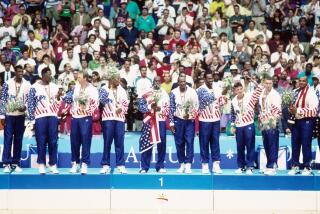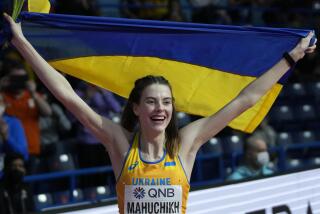Soviet Union Might Lose Its Best Players : Basketball: Lithuania’s recent declaration of independence could change the picture.
- Share via
MOSCOW — On the living room wall of Alexander Gomelsky’s apartment is a large color photograph of him being tossed into the air by his players after he coached the Soviet Union’s basketball team to the championship at the 1988 Summer Olympics.
Waiting with outstretched arms to catch him, along with other members of the team, are four Lithuanians, including perhaps the best players the Soviets have ever had--center Arvydas Sabonis and guard Sarunas Marciulionis.
The picture for basketball in his country, Gomelsky admitted, would be much different without Lithuania, a Baltic state of 3.7 million people that declared its independence on March 13 from the other 14 republics within the Soviet Union. Although the Soviet government has ruled that action invalid, Lithuania has proceeded toward independence in virtually every area of life, including sports.
In an effort to keep a team that won the gold medal in Seoul after upsetting the United States in the semifinals together for as long as possible, Gomelsky, promoted last year to chairman of the Soviet basketball federation, will meet here today with the president of Lithuania’s Olympic Committee, Arturas Povilionas.
Gomelsky said last week he will ask Povilionas to give his blessing to Lithuanians who want to play for the Soviet Union this summer at the Goodwill Games in Seattle and the World Championships in Argentina.
Povilionas does not have to approve in order for the players to compete for the Soviets because Lithuania is not recognized as an independent country by any international sports governing body, including basketball’s, but Gomelsky said it would be easier for all involved if he did.
Not only is Povilionas expected to respond negatively, it is not clear whether the Lithuanians want to play for the Soviets. The only player who has responded publicly, Sabonis, said he would play only for Lithuania.
One member of Lithuania’s Olympic Committee, Arvydas Guorzaietis, said Saturday that some basketball players, as well as athletes in other sports that have major international competitions this year, might decide otherwise if they receive money to play by Soviet sports officials. But he warned that they will suffer consequences.
“All who do that will not play for Lithuania in the future,” he said. “The public mood is angry against Moscow.”
In interviews last week, Soviet officials criticized the Lithuanian Olympic Committee for placing athletes under that sort of pressure and said political leaders in Lithuania are using sports to further their nationalistic cause.
“In 1980 and ‘84, athletes became hostages of the politicians who used sports to achieve political goals,” said Nikolai Rusak, chairman of the Soviet sports federation, Goskomsport. “As a result, U.S. and Soviet athletes did not compete against each other (in the Summer Olympics) for more than 10 years. Now, looking back, both countries are very sorry for what happened.
“Now, the Lithuanian Olympic Committee is beginning to make the same mistakes we made before. Sports should not be used to separate people. It should be used to bring them together.
“But the officials there have taken this position whether or not it coincides with the feelings of the athletes and coaches in Lithuania. I have had a lot of telephone calls from them. They say they are ready to compete for the Soviet Union.”
In the only test so far, a Lithuanian cross-country skier won an international championship last week for the Soviet Union.
But Soviet officials are most concerned about the decisions of the basketball players, who form the nucleus of the national team. Unlike other republics such as Russia, the Ukraine and Georgia, where soccer is the most popular sport, the Baltic states--Lithuania, Latvia and Estonia--traditionally have favored basketball.
In the years immediately preceding World War II, when the Baltic states were independent, Lithuania was considered a basketball power, once winning the European championship. But it earned no concessions from its neighbor, Latvia, which once protested so vehemently over its rival’s use of a tall American of Lithuanian descent in the pivot that the two countries temporarily broke off diplomatic relations.
Basketball historians here say that Baltic natives who lived for a period in the United States took the sport with them when they returned home. One reason it has flourished there more than in other republics in recent years is because the Baltic states were able to pirate telecasts of NBA games from Finland.
When the Atlanta Hawks made a three-game tour of the Soviet Union in 1988, more than 1 million fans requested tickets for the game in the Lithuanian capital of Vilnius. A sellout crowd of 16,000 bought tickets there for the team’s practice.
Of the seven Soviets playing basketball professionally in other countries, including Marciulionis with the Golden State Warriors, five are from Lithuania. Gomelsky said two young Lithuanians, who are playing at home, are contenders for the national team. The new coach, Valdas Garastas, also is from Lithuania.
He has a four-year contract that will expire after the 1992 Summer Olympics in Barcelona. Gomelsky said he recently met with Garastas and expects him to fulfill the terms of the contract, but there is pressure on the coach in Lithuania to resign.
All three Baltic states had independent national Olympic committees in the 1920s and ‘30s, competing in the Olympic Games as separate nations from 1924 through 1936. Estonia and Latvia even had members on the International Olympic Committee (IOC).
When the states were annexed by the Soviet Union in a 1940 pact between Stalin and Hitler, they lost their independence. Even the Soviet government acknowledges that the annexation was illegal, but their paths to independence remains filled with obstacles. Likewise, their national Olympic committees, all three of which were re-established within a two-month period in late 1988 and early ‘89, have not been recognized either by the Soviets or the IOC.
Representatives of the three Olympic committees visited the IOC late last year but were told that they could not be considered for membership until they were associated with five international sports federations.
But the federations, as well as the IOC, are reluctant to act without approval from one of their most influential members, the Soviet Union. The executive board of the Soviet Olympic Committee is meeting Thursday to set a date for a special Congress that will determine whether Lithuania’s Olympic Committee should be independent. Anticipating defeat, Lithuanian sports officials will attend the Congress only as observers because they do not want to acknowledge that the Soviets maintain control over them.
Meantime, Lithuanian teams, including strong basketball entries from Vilnius and Kaunas, have withdrawn from Soviet leagues. That followed a similar action by soccer teams in Georgia, which also has an active independence movement.
“I have told both the Georgians and the Lithuanians that if their athletes miss even half a year of competition in the Soviet leagues, their progress is going to be set back five years,” Rusak said.
The Lithuanians are considering contingency plans, including the establishment of leagues that might involve teams from other countries as well as the other Baltic states and Georgia.
They also are negotiating for a presence in the Goodwill Games.
“Public opinion will be so strong in our favor that concessions will be made,” Guorzaietis said.
But Goodwill Games officials also have to consider their relationship with the Soviets, without whom there would be no Goodwill Games. A spokesman for the U.S. Lithuanian community, Valdas Adamkas, recently met with Games President Bob Walsh and suggested a compromise that would allow Lithuanian athletes to compete under their own flag but not for medals.
More to Read
Go beyond the scoreboard
Get the latest on L.A.'s teams in the daily Sports Report newsletter.
You may occasionally receive promotional content from the Los Angeles Times.







